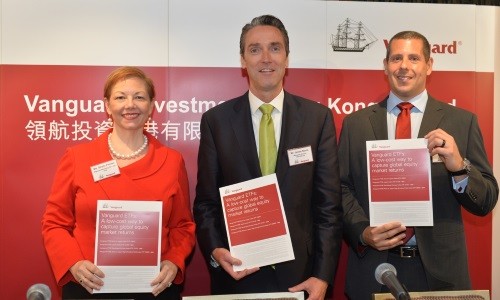Vanguard Launches High Dividend Index Fund
Post on: 30 Август, 2015 No Comment

by Adam Nash on November 18, 2006
Two news tidbits this week that had me thinking about new investment options.
First, Vanguard just launched a new index fund: the High Dividend Index Fund. They are going to be providing access to the fund in both traditional mutual fund form (Ticker: VHDYX ) and in ETF form (Ticker: VYM ).
Based on the press release. it looks like the funds will match the FTSE High Dividend Yield Index, which is shrouded in some marketing double-speak mystery. I cannot find the actual companies included in this index anywhere. It looks like this index was created almost exclusively to be mirrored in the Vanguard fund.
The mutual fund version of the fund will have a 0.40% expense ratio, the ETF will have a 0.25% expense ratio. As a result, youll want to use the mutual fund as a vehicle if you are making small, regular investments in the fund (like $100 per month). Otherwise, the commissions will killd you. If you are putting a lot of money to work at one time, and you are using a low-cost broker, the ETF is going to be a better buy and hold vehicle given its low expense ratio.
This fund might seem to be similar to the Vanguard Dividend Appreciation Index Fund. They launched the mutual fund (Ticker: VDAIX ) and ETF (Ticker: VIG ) in April 2006, and those funds feature expense ratios of 0.40% and 0.28%, respectively. The difference is the index it tracks this older fund tracks the performance of the Dividend Achievers Select Index, which includes stocks with a record of steadily increasing dividends. The funds focus on stocks exhibiting dividend growth distinguishes it from this new fund, which emphasizes purely yield.
I personally have a stock account made up of high dividend/cash flow companies as a conservative base to my retirement funds. Seeing this type of product from Vanguard has me thinking that it might make sense to just let them do the work for me here the expense ratio is incredibly low.
This fund is clearly a response to the very high interest in more fundamentals-based indexing, which John C. Bogle, Vanguard Chairman, has been fairly vocal about dismissing. There is definitely a very grey area between an index fund and an actively managed fund. After all, an index itself is created by a group of people, and changed over time. So the truth is, index vs. active is somewhat in the eye of the beholder. The assumption is that an index will change infrequently, leading to lower trading costs and more consistent representation of some asset class or sub-class.
For those of you who are curious, it looks like the FTSE High Dividend Yield Index will be recalculated annually, based on the following formula :
The new custom index consists of stocks that are characterized by higher-than-average dividend yields, and is based on the U.S. component of the FTSE Global Equity Index Series (GEIS). Real estate investment trusts (REITs), whose income generally do not qualify for favorable tax treatment as qualified dividend income (QDI) are removed, as are stocks that have not paid a dividend during the previous 12 months. The remaining stocks are ranked by annual dividend yield and included in the target index until the cumulative market capitalization reaches 50% of the total market cap of this universe of stocks.
There are already a large number of high dividend focused mutual funds and ETFs out there (for example, the iShares Dow Select Dividend (Ticker: DVY )), but with Vanguards reputation and penchant for low costs, its always worth giving their offerings a strong look. As Ive posted before, I am a huge fan of Vanguard, and truly believe that they work to lower costs to the bare bone for their investors.














